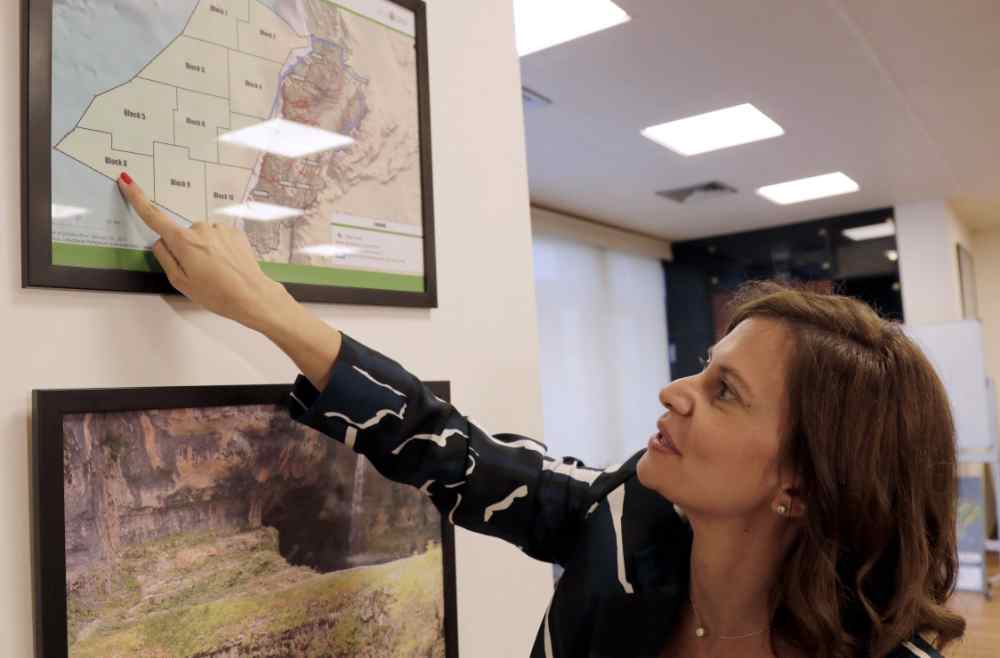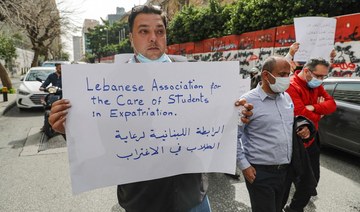MISSOURI, USA/ BEIRUT: Syria has signed a four-year oil and gas exploration deal with a Russian company in Mediterranean waters that Lebanon claims as its own. The two blocks to be explored under the new contract overlap with Lebanese maritime areas for energy exploration along the country’s northern border. Yet Lebanese outrage has been conspicuous by its absence.
Now imagine a time, not so long ago, when the shoe was on the other foot. Lebanon demarcated its maritime borders in 2011 and, three years later, offered tenders for oil and gas companies for Block No.1 in the north. Justifiably or not, Syria responded by not recognizing the Lebanese demarcation and lodging a protest.
The striking contrast between the two reactions, separated by seven years, was not lost on the Lebanese opposition.
“Where do the official Lebanese authorities stand on this issue?” asked Rola Tabsh, an MP from the Future Movement bloc, when Syria announced the contract last month. “What is this suspicious coma? We waited for the violation from the south, from the enemy (Israel), but it came from the north, from a brotherly country.”

Similar concern was voiced by Richard Kouyoumjian, former minister and serving member of the Lebanese Forces parliamentary bloc, who said: “The government and the relevant ministries are required to have a sovereign position and clear clarification.”
He called for the “resumption of demarcation negotiations in the south, an end to Syrian complicity and plundering of our money and oil wealth.”
In the south, Israel’s demarcation line conflicts with the Lebanese one, which has led to protracted indirect negotiations sponsored by the UN and mediated by the US. The Lebanese-Israeli dispute and negotiations have been ongoing for more than 10 years now.
Hezbollah, being a pro-Iranian Shiite militia and political party, did not appear in favor of even indirect negotiations with Israel over the issue, but grudgingly acceded to them. A resolution to the maritime border dispute with Israel remains crucial to Lebanon’s ability to attract oil and gas companies to its waters.

A billboard in southern Lebanon bears pictures of Hezbollah leader Hassan Nasrallah, Iran's Supreme Leader Ayatollah Ali Khamenei (C) and its late founder Ayatollah Ruhollah Khomeini. (AFP)
Hezbollah understood that it would take the blame if Lebanon failed to develop offshore oil and gas deposits due to a refusal to negotiate. But the group still tried to link the maritime borders issue to a dispute it has regarding Lebanon’s land border with Israel.
Although Israel completely withdrew from Lebanon in 2000, Hezbollah claims that a small tract of land known as the Shebaa Farms are also part of Lebanon and still occupied by Israel. Even though the UN determined the Shebaa Farms to be occupied Syrian land, the issue provides Hezbollah with an excuse to maintain its conflict with Israel and justification to retain armaments, long after all other Lebanese militias disarmed.
Hezbollah — and the Lebanese state it has largely controlled since 2008 — has proven vociferous in defending its interests regarding Israel. It therefore strikes many Lebanese as more than curious that the government has yet to utter a word regarding Syrian encroachments in the north.
The Syrian contract with a Russian company includes at least 750 square kilometers of maritime waters claimed by Lebanon. If Mediterranean oil and gas deposits comparable to those of Israel and Cyprus exist off Lebanon’s shores, the potential revenues from such could go a long way in helping Lebanon out of its current financial woes.
INNUMBER
750 square kilometers Lebanese area in Block No.1 allegedly allotted by Syrians for oil exploration by Russians.
A lot of money appears to be at stake, yet the same Lebanese leaders who appear so determined to stand up for their rights on the border with Israel do nothing to stop Syrian encroachments.
The Lebanese government, very much under the sway of Hezbollah, knows its limits all too well. Nevertheless, in a belated effort at damage control, the foreign ministry said last week it was preparing a road map for negotiations with Syria over the demarcation of maritime borders.
Charbel Wehbe, the caretaker foreign minister, told a UAE daily that an official recommendation would be made once the ministry finalized its assessment of an unofficial copy of the Syrian contract. However, those waiting for a strong protest by Lebanon should not hold their breath.
Ideally, according to analysts, Lebanon must inform Syria of its objection.

Lebanon’s former minister for energy and water, Nada Boustani, points to a map of oil and gas blocks in the Mediterranean, above. (AFP)
“It could be through the Syrian ambassador to Lebanon or a visit by the Lebanese foreign minister to Syria,” Marc Ayoub, an expert on energy affairs in Lebanon and the Middle East, told Arab News.
“If Syria refuses to acknowledge this objection, Lebanon must resort to the UN to object to any exploration process that will take place. It can request a halt to exploration if Lebanon presents documents proving its ownership of these areas.”
Weak states see their rights trampled upon all the time, of course. As the Greek philosopher Thucydides remarked more than 2,000 years ago, “The strong do what they can and the weak suffer what they must.” The Israeli state’s power far exceeds that of Syria, so this explanation seems insufficient. Leaders in Beirut had no difficulty going to the UN for help in their maritime dispute against Israel.
To many Lebanese, the real explanation for the apparent double standard appears obvious: Hezbollah pursues its own interests rather than those of Lebanon, and Hezbollah is beholden to Syria and Iran.
As long as the Lebanese state remains under the sway of Hezbollah and its allies, the Lebanese national interest comes second. Under such circumstances, even a state as weak as civil war-torn Syria can take advantage of Lebanon.

Hezbollah’s leading presence in the government causes investment and development aid to dry up. (AFP)
Lebanon’s ills in fact go much further than a government that will not even stand up to protect its northern border. Even after the devastating Beirut port explosion of last year, Hezbollah has blocked government reforms necessary to attract an international financial rescue package for the country.
Hezbollah’s leading presence and influence in the government causes investment and development aid to dry up, especially as some fear running afoul of anti-Iran sanctions should they deal with an actor so closely linked to Tehran. Hezbollah’s presence on Western terror lists complicates things enormously for the country.
Nonetheless, Hezbollah fighters still openly involve themselves in the Syrian civil war on behalf of the Assad regime. It is also no secret that Hezbollah advisers go to Yemen to help the Houthis, and Hezbollah operatives continue to carry out various terrorist plots in Cyprus, Georgia, Argentina, Southeast Asia and elsewhere.

Lebanon’s tensions with its southern neighbor Israel, often at the behest of Hezbollah and its Iranian backers, have seen it turn a blind eye to the activities of its other neighbor, Syria. (AFP)
Lebanon’s foreign policy is now so closely aligned with that of Iran and Syria that the country skips Arab League meetings and votes if it risks criticizing Iran’s behavior in the region. Financial support from the Arab Gulf dries up every time Lebanon votes with Iran in international forums, or refuses to condemn things like Iran’s 2016 attack on Saudi diplomatic missions.
Normally, Lebanese parties should also be especially wary of Syria. Syrian nationalists have long coveted Lebanon, viewing it as a part of Syria which French colonialists unjustly truncated away from greater Syria.
After the Lebanese civil war ended in 1991, Syria continued to occupy Lebanon for more than a decade. During that time, the Syrians did not even maintain an embassy in the country. From the Syrian point of view, one need only have embassies for foreign countries, and Lebanon is a part of Syria.

Lebanon's Energy Minister Cesar Abi Khalil (2-R) is handed a document by Total exec Stephane Michel on Feb.9, 2018. (AFP)
Lebanon’s failure to even protest Syria’s oil and gas exploration in waters it claims therefore appears all the more alarming. What is the point of having one’s own state if that state will not even attempt to counter encroachments from its neighbor?
From the perspective of Lebanese national interests, the country could benefit from less tension with Israel to the south — especially over such a non-issue as the 22 square kilometre Shebaa Farms — and more of a principled defense of its sovereignty against the designs of “brotherly” Syria to the north.
If the economic situation were otherwise good in Lebanon, one could perhaps forgive the de-facto surrender to Syrian encroachments. Unfortunately, the economic situation in Lebanon continues to careen from crisis to crisis.
If a Lebanon desperate for more resources cannot even stand up for its claims against an extremely weakened Syrian state, however, then the future truly bodes ill once Damascus regains some of its strength.






























